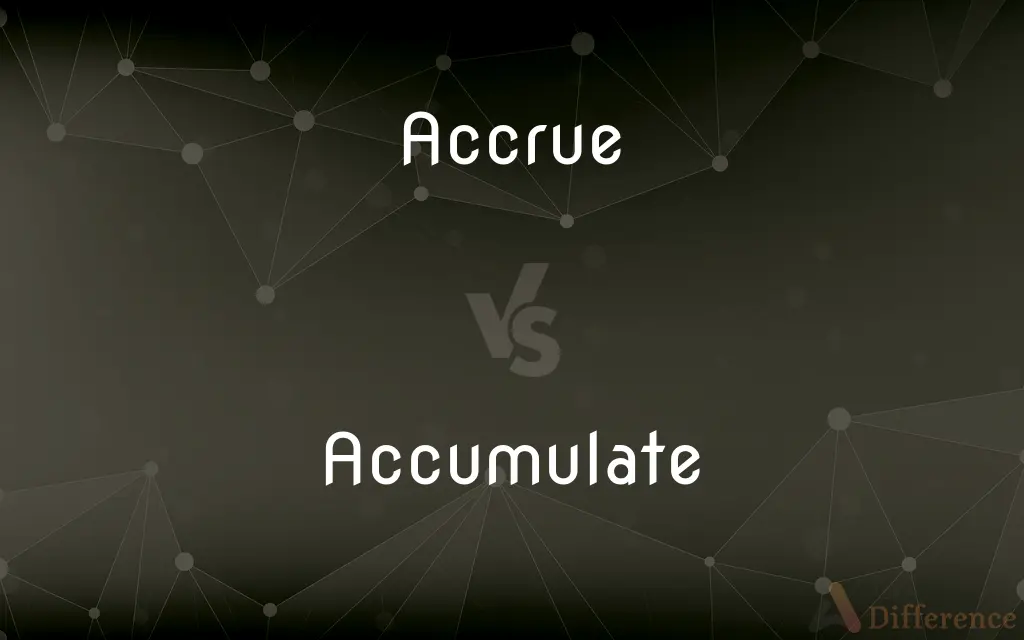Accrue vs. Accumulate — What's the Difference?
By Maham Liaqat & Fiza Rafique — Updated on March 15, 2024
Accrue refers to the gradual increase of something over time, often through a natural process or as a result of interest or investment, while accumulate denotes the gathering or amassing of items or quantities, often through active collection or addition.

Difference Between Accrue and Accumulate
Table of Contents
ADVERTISEMENT
Key Differences
Accrue is primarily used in financial and legal contexts, where it describes the natural growth of money or benefits over time, such as interest on savings or rights under a contract. On the other hand, accumulate involves actively gathering or adding to a pile or total, which can be physical items, such as books, or abstract quantities, like wealth. Accumulation suggests a more deliberate effort or process, like saving money over time by depositing earnings into an account.
While accrual often happens within predefined conditions or agreements, leading to expected increases over time, accumulation can result from various actions and choices, leading to potentially unexpected totals. For instance, benefits under a policy might accrue at a predetermined rate, whereas wealth can accumulate from different sources and activities, not all of which are planned or predictable.
Accrual typically involves a specific mechanism or formula, such as the compounding of interest, which results in growth that can be anticipated and calculated. Accumulation, in contrast, may not follow a predictable pattern and can depend on numerous factors, including personal decisions, market conditions, or random events. This makes the outcomes of accumulation more variable compared to the usually steady and predictable nature of accrual.
The distinction between accrue and accumulate also lies in their usage context. Accrue is more specialized, often related to finances or legal rights, suggesting a passive and automatic increase. Accumulate, however, is more broadly applicable and can refer to any process of gathering or increasing quantities over time, emphasizing the act of collection rather than the passive experience of growth.
Both accrue and accumulate describe increases over time, but they differ in the nature of these increases, the degree of activity involved, and their typical contexts of use. Accrue emphasizes passive growth according to specific rules or conditions, while accumulate highlights active gathering and the aggregation of amounts or items from various sources.
ADVERTISEMENT
Comparison Chart
Definition
Gradual increase over time, often through interest or rights
Gathering or amassing of items or quantities
Context
Primarily financial and legal
Broad, including financial, physical, and abstract contexts
Nature of Increase
Passive and automatic based on conditions
Active and often deliberate
Predictability
Often predictable and calculable
Can be unpredictable and variable
Example Usage
Interest accrues on a savings account.
Accumulating wealth through investments and savings.
Compare with Definitions
Accrue
To grow or accumulate over time as a natural result of interest or benefits.
Vacation days accrue each month you work.
Accumulate
Broadly applicable across various contexts.
They accumulated evidence for the case over years.
Accrue
Used in legal and financial documents to denote automatic growth.
Penalties accrue if payment is delayed.
Accumulate
To gather or collect items or quantities over time.
He accumulated a vast collection of rare books.
Accrue
Refers to the accumulation of benefits or amounts in a financial context.
Interest on the loan accrues daily.
Accumulate
Involves actively adding to a total or pile.
She has been accumulating savings for her world trip.
Accrue
Often involves a calculable and predictable process.
The dividends accrue at a fixed rate.
Accumulate
Can refer to the amassing of both tangible and intangible items.
Accumulating knowledge is essential for personal growth.
Accrue
Indicates a passive increase according to specific terms or conditions.
Rights under the contract accrue over the period of employment.
Accumulate
Does not imply a specific mechanism or predictability.
Dust and debris accumulate in unused spaces.
Accrue
To come to one as a gain, addition, or increment
Interest accruing in my savings account.
Accumulate
To gather or cause to increase; amass
We accumulated enough wood for a fire. Nearly all bank accounts accumulate interest.
Accrue
To increase, accumulate, or come about as a result of growth
Common sense that accrues with experience.
Accumulate
To be the site for (a gradually increasing mass), especially as a result of disuse or neglect
Those old books are accumulating dust.
Accrue
To come into existence as a claim that is legally enforceable.
Accumulate
To mount or pile up; increase
Snow is accumulating on the roads.
Accrue
To accumulate over time
I have accrued 15 days of sick leave.
Accumulate
(transitive) To heap up in a mass; to pile up; to collect or bring together (either literally or figuratively)
He wishes to accumulate a sum of money.
Accrue
(intransitive) To increase, to rise
Accumulate
(intransitive) To gradually grow or increase in quantity or number.
With her company going bankrupt, her divorce, and a gambling habit, debts started to accumulate so she had to sell her house.
Accrue
(intransitive) To reach or come to by way of increase; to arise or spring up because of growth or result, especially as the produce of money lent.
Accumulate
To take a higher degree at the same time with a lower degree, or at a shorter interval than usual.
Accrue
To be incurred as a result of the passage of time.
The monthly financial statements show all the actual but only some of the accrued expenses.
Accumulate
Collected; accumulated.
Accrue
(transitive) To accumulate.
He has accrued nine sick days.
Accumulate
To heap up in a mass; to pile up; to collect or bring together; to amass; as, to accumulate a sum of money.
Accrue
To become an enforceable and permanent right.
Accumulate
To grow or increase in quantity or number; to increase greatly.
Ill fares the land, to hastening ills a prey,Where wealth accumulates, and men decay.
Accrue
(obsolete) Something that accrues; advantage accruing
Accumulate
Collected; accumulated.
Accrue
To increase; to augment.
And though power failed, her courage did accrue.
Accumulate
Get or gather together;
I am accumulating evidence for the man's unfaithfulness to his wife
She is amassing a lot of data for her thesis
She rolled up a small fortune
Accrue
To come to by way of increase; to arise or spring as a growth or result; to be added as increase, profit, or damage, especially as the produce of money lent.
The great and essential advantages accruing to society from the freedom of the press.
Accumulate
Collect or gather;
Journals are accumulating in my office
The work keeps piling up
Accrue
Something that accrues; advantage accruing.
Accrue
Grow by addition;
The interest accrues
Accrue
Come into the possession of;
The house accrued to the oldest son
Common Curiosities
Can both terms be used interchangeably?
While they share similarities, their specific contexts and nuances of meaning make them not entirely interchangeable.
Can something accumulate without direct action?
Typically, accumulation involves some level of active collection, but it can also happen as a side effect of inaction, such as dust gathering.
How do you know when to use accrue vs. accumulate?
Use accrue when referring to passive, predictable increases, especially in financial or legal contexts, and accumulate for broader contexts of active gathering.
What is the main difference between accrue and accumulate?
Accrue focuses on passive growth over time, often in financial contexts, while accumulate involves actively gathering or adding to a total.
Can interest both accrue and accumulate?
Interest accrues as per the terms of an account or loan, contributing to the total wealth or amount owed, which can be seen as accumulating.
Do accrued items ever become accumulated?
Conceptually, accrued items add to a total that could be considered accumulated, but the terms emphasize different aspects of the increase.
Can accrual be negative?
Typically, accrual refers to growth, but in some contexts, it could describe the accumulation of negative amounts, like penalties.
What's the difference in planning between accrual and accumulation strategies?
Accrual strategies often involve setting conditions for passive growth, whereas accumulation strategies require active planning to gather resources.
Is accruing always related to money?
Primarily, but it can also apply to anything that increases passively over time, like benefits or rights.
What does it mean for rights to accrue?
It means rights increase or become entitled over time, often according to the terms of a contract or agreement.
Is it possible to accumulate without intending to?
Yes, one can accumulate things like clutter or debt without intentional effort.
Why might someone prefer accrual over accumulation in finance?
Accrual can offer a predictable, passive way to increase wealth, appealing to those looking for low-maintenance growth.
How do environmental factors contribute to accumulation?
Environmental factors like wind or water flow can cause physical items, such as leaves or sediment, to accumulate in certain areas.
How do companies use the concept of accrual in accounting?
Companies use accrual accounting to record revenues and expenses when they are earned or incurred, not necessarily when cash is exchanged.
What is an example of accumulation in nature?
Snow accumulating during a snowstorm is an example of accumulation in nature.
Share Your Discovery

Previous Comparison
Restricted vs. Limited
Next Comparison
Stigmatism vs. StigmaAuthor Spotlight
Written by
Maham LiaqatCo-written by
Fiza RafiqueFiza Rafique is a skilled content writer at AskDifference.com, where she meticulously refines and enhances written pieces. Drawing from her vast editorial expertise, Fiza ensures clarity, accuracy, and precision in every article. Passionate about language, she continually seeks to elevate the quality of content for readers worldwide.
















































